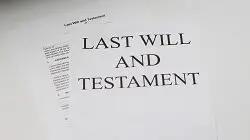Question: I have an estate plan in place including a will, power of attorney, and healthcare documents. Is there anything else I need to do?
Answer: Creating an estate plan is the first step in preparing for your future. It is also important to ensure that all your assets are properly titled or have the correct beneficiary designation language in order to carry out your wishes regarding the distribution of your assets at your death.
Your last will and testament is a document that memorializes your wishes with respect to how you want your assets to be distributed after you die. Any assets held in your sole name will be passed on to the beneficiaries listed in your will through a process called probate. If your assets already have a joint owner or beneficiary listed, these assets will pass to that person or persons listed and will not go through the probate process.
A will may have specific provisions that control not only who will receive part of your assets but also how they will receive it. This is a way you can provide protection for your beneficiaries. As an example, Linda creates a will, which states that upon Linda’s death, all assets be paid out to her husband, if living, otherwise equally to her children. Her husband however is receiving government benefits, so her will directs that her husband’s share be paid out to him in a Supplemental Needs Trust (SNT). The purpose of this trust is to ensure that the assets paid out to him are protected, while also ensuring he does not lose his government benefits. Additionally, Linda’s will directs any sums payable to her children to be paid out to them in descendants’ trusts. The purpose of these trusts is to give her children creditor protection while also ensuring that assets paid out to them are not included in their taxable estate. Furthermore, Linda’s daughter is 19 years old, so her trust specifically directs that a third-party act as Trustee until Linda’s daughter attains the age of 25, at which point she will manage her own trust.
On paper, Linda’s plan may follow her wishes. However, one of Linda’s primary assets is a large brokerage account and this account is listed as transfer on death (TOD) to her husband. The contingent TOD beneficiaries listed are all of her children. Should Linda die before her husband, this account will automatically go to him and will not pass pursuant to the provisions listed in her will. Therefore, the account will not be payable to her husband’s SNT and he will likely lose his government benefits. If Linda dies after her husband, the account will be paid out to her children, outright and free of trust, thus defeating the purpose of creating descendants’ trusts for her children. The same issue could arise if her husband or children were listed as joint owners of an account, they would become sole owner upon her death and ignore the trust provisions in her will.
To avoid this problem, Linda should remove her husband and children as beneficiaries of the account, and instead list as the beneficiaries either her estate or the trusts created within her will. This will guarantee that the brokerage account will be paid into the trusts in her will which will provide the intended protections to her family members.
It is extremely important to make sure your attorney has all information as it relates to your finances and family dynamic. Not only should your attorney be provided with a complete list of assets (including how they are titled and the names of the beneficiaries listed), your attorney should also have full knowledge of any family concerns that may need to be addressed within your plan. It was important that Linda’s attorney understood that her husband relied on government benefits and that her young children may need a little extra protection.
It is best to consult with an Estate Planning and Elder Law Attorney to review your current estate planning documents and all accounts to ensure your wishes will be carried out both through the probate process, as well as outside probate.





